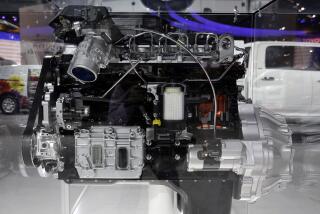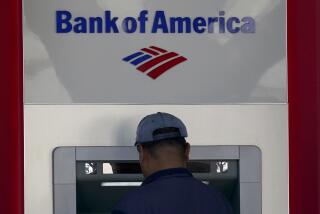U.S. says UBS was motivated by ‘sheer greed’ in Libor rigging
- Share via
WASHINGTON -- U.S. officials said Wednesday that banking giant UBS was motivated by “sheer greed” in rigging a key global interest rate and that the $1.5 billion in penalties the firm agreed to pay sends a strong message to the financial industry.
The UBS settlement, which includes the company pleading guilty to felony wire fraud charges, follows a $450-million fine against British bank Barclays in the scandal over manipulating the London Interbank Offered Rate, known as Libor.
The settlement involved U.S., British and Swiss authorities.
“We cannot and we will not tolerate misconduct on Wall Street of the kind admitted to by UBS today and by Barclays last June,” said Assistant Atty. Gen. Lanny Breuer, head of the criminal division.
The plea agreement on wire fraud charges by a UBS subsidiary in Japan, which included a $100-million fine, marks the first time since 2005 that a major financial institution has pleaded guilty to criminal charges, the Justice Department said.
U.S. officials also announced criminal charges against two former senior traders for UBS in connection with the scandal.
Tom Alexander William Hayes, 33, of Britain was charged with conspiracy and wire fraud, and Roger Darin, 41, of Switzerland was charged with conspiracy. Both remain abroad and the Justice Department will try to extradite them.
Officials said that from 2006 through 2009 UBS traders placed bets on the movement of Libor and manipulated the rate, which is used as a benchmark to set interest rates for many mortgages, credit cards and other consumer lending instruments.
“The motivation here was nothing short of sheer greed, and the scheme was nothing short of a shell game, a Wall Street version of three-card monte,” said Kevin Perkins, associate director of the FBI, which helped investigate the case.
“In today’s global economy, everything is interconnected,” he said. “And when banks and traders rig interest rates, everyone pays.”
David Meister, director of enforcement for the Commodity Futures Trading Commission, said UBS traders undermined the integrity of an interest rate that is “critically important to the markets and the American public.”
“UBS, day in and day out, brazenly gamed some of the most important interest rate benchmarks in the world,” he said. “Acting through dozens of employees and some senior managers, working out of offices on three continents, the bank engaged in thousands of manipulative trades to drive the banks’ trading profits higher.”
Much of the activity took place at UBS Japan Securities Co., where Hayes was a senior trader. The Justice Department released internal UBS messages in which Hayes and others talked about their alleged manipulation.
In one from November 2006, Hayes told a UBS employee who submitted rate information for Libor that he and Darin “skew the libors a bit” and then said he needed the six-month rate to stay high for three days.
Breuer and his boss, Atty. Gen. Eric H. Holder Jr. defended the decision not to criminally charge the UBS parent company.
“Our goal here is not to destroy a major financial institution,” Breuer said. He noted that UBS changed its senior management during the investigation and had cooperated with officials as well as set up new compliance mechanisms to prevent a recurrence of the rate rigging.
Holder said that the stability of financial markets is one of the factors the Justice Department considers in deciding whether to bring charges. And even though UBS entered into a non-prosecution agreement that included a $400-million fine, the company “has been charged criminally.”
“Now, we can parse that if we want to,” he said. “But the reality is that UBS has been charged criminally; individuals have been charged criminally.”
ALSO:
Libor rate-rigging scandal intensifies pressure on Wall St.
UBS agrees to pay $1.5 billion in settlement of Libor probe
House panel probes banks’ alleged role in LIBOR-fixing scandal
Follow Jim Puzzanghera on Twitter and Google+.
More to Read
Inside the business of entertainment
The Wide Shot brings you news, analysis and insights on everything from streaming wars to production — and what it all means for the future.
You may occasionally receive promotional content from the Los Angeles Times.











